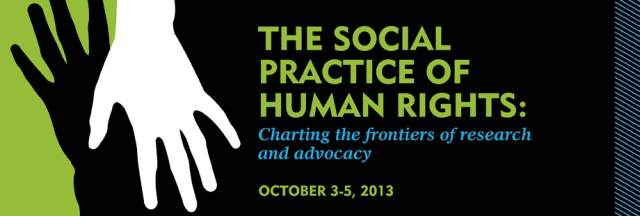Paper/Proposal Title
Professional Associations and Human Rights Advocacy: A Case Study of the Role of National Medical Associations in Policy Debates over Genital Cutting
Location
River Campus - Room M2265
Start Date
10-4-2013 3:15 PM
Abstract
This paper considers professional associations as potential vehicles for advancing fundamental human rights through the setting of professional standards, norm diffusion, and lobbying. In contrast to much scholarship in the field which focuses on organizations whose central missions involve human rights advocacy, this paper considers the ways in which professional associations not constituted within a human rights framework may serve as a vehicle for (or impediment to) the promotion of fundamental human rights in their areas of professional work and expertise. Specifically, the paper presents a case study of divergent perspectives among national medical associations on the issue of genital cutting and the ways in which these associations have influenced pertinent public debates and policies in their respective countries. In particular, the case study focuses on the Royal Dutch Medical Association’s involvement in public debates over genital cutting in the Netherlands, where the association has taken a formal position against the non-therapeutic genital cutting of both boy and girl children and has shaped the national debate accordingly. This case study indicates that professional associations have the capacity to move public policy relevant to fundamental human rights in particular directions and sheds light on the potential ways in which strategies for promoting human rights (including standard-setting, norm-diffusion, and the shaping of key policies and regulations) can be deployed via groups of critically-positioned professionals, including doctors, lawyers, educators, and the police.
Professional Associations and Human Rights Advocacy: A Case Study of the Role of National Medical Associations in Policy Debates over Genital Cutting
River Campus - Room M2265
This paper considers professional associations as potential vehicles for advancing fundamental human rights through the setting of professional standards, norm diffusion, and lobbying. In contrast to much scholarship in the field which focuses on organizations whose central missions involve human rights advocacy, this paper considers the ways in which professional associations not constituted within a human rights framework may serve as a vehicle for (or impediment to) the promotion of fundamental human rights in their areas of professional work and expertise. Specifically, the paper presents a case study of divergent perspectives among national medical associations on the issue of genital cutting and the ways in which these associations have influenced pertinent public debates and policies in their respective countries. In particular, the case study focuses on the Royal Dutch Medical Association’s involvement in public debates over genital cutting in the Netherlands, where the association has taken a formal position against the non-therapeutic genital cutting of both boy and girl children and has shaped the national debate accordingly. This case study indicates that professional associations have the capacity to move public policy relevant to fundamental human rights in particular directions and sheds light on the potential ways in which strategies for promoting human rights (including standard-setting, norm-diffusion, and the shaping of key policies and regulations) can be deployed via groups of critically-positioned professionals, including doctors, lawyers, educators, and the police.




Comments
This biennial conference provides a unique space for scholars, practitioners and advocates to engage in collaboration, dialogue and critical analysis of human rights advocacy — locally and globally. Learn more about the Human Rights Center at the University of Dayton >>>.